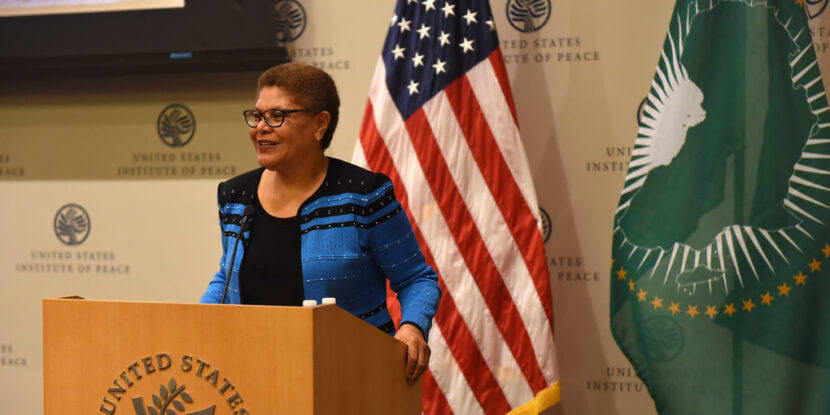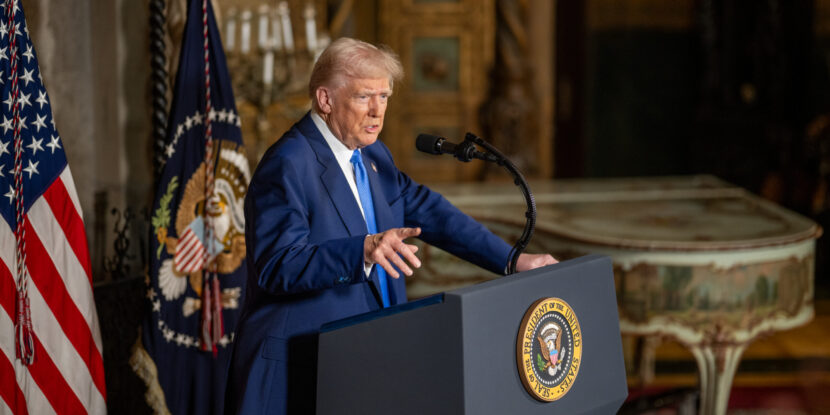
PULSE POINTS:
❓What Happened: Los Angeles Mayor Karen Bass issued an executive order to simplify filming processes in the city.
👥 Who’s Involved: Mayor Karen Bass, President Donald J. Trump, entertainment professionals, and the Department of Commerce.
Your free, daily feed from The National Pulse.
📍 Where & When: Los Angeles, California; announcement made Tuesday, May 20, two weeks after President Trump’s tariff declaration.
💬 Key Quote: “Keeping entertainment production in L.A. means keeping good-paying jobs in L.A., and that’s what we are fighting for,” said Bass.
⚠️ Impact: The directive seeks to retain entertainment jobs in Los Angeles amidst competition from other U.S. locations and foreign countries.
IN FULL:
Democratic Mayor Karen Bass issued an executive order on Tuesday designed to streamline the filmmaking process in Los Angeles, declaring her intent to keep entertainment production within the city. The announcement comes over two weeks after President Donald J. Trump revealed plans for a 100 percent tariff on foreign-produced movies, citing concerns over national security and economic harm.
Bass’s announcement appears to largely align with Trump’s push to reshore film productions, running counter to efforts by national Democratic Party leaders to undermine the President’s trade agenda. The National Pulse previously reported that Trump’s film tariff announcement also received backing from the Teamsters.
Bass’s directive aims to cut bureaucratic hurdles for filmmakers, making it easier to shoot at popular Los Angeles locations such as the Griffith Observatory, the L.A. Central Library, and the Port of Los Angeles. Additionally, the order reduces the requirement for city employees to be present during filming to just one, a move intended to lower costs for production teams.
“We are going to fight now,” Bass stated, continuing: “While we push for the tax credits to be passed in Sacramento, we need to do what we can today to impact building in Los Angeles.” She added: “Keeping entertainment production in L.A. means keeping good-paying jobs in L.A., and that’s what we are fighting for.”
The executive order comes amid increasing competition from other U.S. cities and foreign countries offering more affordable and accessible production options.
President Trump recently criticized Hollywood’s reliance on foreign incentives, describing it as a “national security threat” and a source of economic devastation. In a Truth Social post earlier this month, Trump explained his decision to authorize a 100 percent tariff on foreign-made films, stating, “Hollywood, and many other areas within the U.S.A., are being devastated… WE WANT MOVIES MADE IN AMERICA, AGAIN!”
Trump also highlighted the role of foreign film incentives in what he called “messaging and propaganda,” instructing the Department of Commerce and the U.S. Trade Representative to initiate the tariff process.

PULSE POINTS:
❓What Happened: The Trump administration sanctioned two top members of Cartel del Noreste, a violent Mexican drug cartel and U.S.-designated foreign terrorist organization.
👥 Who’s Involved: Miguel Angel de Anda Ledzema and Ricardo Gonzalez Sauceda, leaders of Cartel del Noreste; U.S. Treasury Department; Office of Foreign Assets Control (OFAC); Homeland Security Investigations (HSI); Bureau of Alcohol, Tobacco, Firearms and Explosives (ATF); Drug Enforcement Administration (DEA); Mexico’s Financial Intelligence Unit.
Your free, daily feed from The National Pulse.
📍 Where & When: Sanctions announced Wednesday; Cartel del Noreste operates near the Laredo, Texas border region.
💬 Key Quote: “We will continue to cut off the cartels’ ability to obtain the drugs, money, and guns that enable their violent activities,” Treasury Secretary Scott Bessent said.
⚠️ Impact: The sanctions aim to disrupt Cartel del Noreste’s operations, including drug trafficking, arms procurement, and violence on both sides of the U.S.-Mexico border.
IN FULL:
The Trump administration has imposed sanctions on two senior leaders of the Cartel del Noreste, a violent Mexican drug cartel and designated foreign terrorist organization, according to an announcement from the U.S. Treasury Department on Wednesday.
The Office of Foreign Assets Control (OFAC) targeted Miguel Angel de Anda Ledzema and Ricardo Gonzalez Sauceda for their roles in facilitating the cartel’s operations. Officials say the group exerts significant control over the border area near Laredo, Texas.
Ledzema, a high-ranking cartel member, was identified as overseeing the acquisition and trafficking of firearms into Mexico. According to the Treasury Department, he coordinated payments to U.S.-based straw purchasers who misrepresented themselves to obtain weapons, later smuggling them into Nuevo Laredo. One such weapon was reportedly recovered after a March 2024 cartel attack on the Mexican military.
Sauceda, previously second-in-command of the cartel, was arrested in February by Mexican authorities. He allegedly led an armed enforcement unit and was linked to violent assaults on Mexican military and police forces. At the time of his arrest, he was found with firearms, methamphetamine, and fentanyl pills.
Treasury Secretary Scott Bessent emphasized the administration’s commitment to confronting the cartel threat, stating, “We will continue to cut off the cartels’ ability to obtain the drugs, money, and guns that enable their violent activities.” Bessent also highlighted the cartel’s role in campaigns of violence, intimidation, and terrorism that endanger communities on both sides of the border.
The sanctions were coordinated with Homeland Security Investigations, the Bureau of Alcohol, Tobacco, Firearms and Explosives, the Drug Enforcement Administration, and Mexico’s Financial Intelligence Unit.
Paul Perez, President of the National Border Patrol Council, praised the administration’s actions, saying they fulfill President Donald J. Trump’s promise to prevent cartels from operating with impunity. “These actions deal a significant blow and send the message to all cartels that President Trump will follow through,” Perez stated.
show less

 1 month ago
2
1 month ago
2








 English (US) ·
English (US) ·